REVIEW: NINA SIMONE: FOUR WOMEN — South Coast Repertory
- TheShowReport

- Oct 18, 2022
- 5 min read
A slow-burning journey of discovery, self-empowerment and healing.

Nina Simone seemed happy in the 1980s, singing in Ronnie Scott’s swinging London jazz club, a resident European star in front of an adoring audience, wowing with the incomparable diversity of her repertoire, enjoying her still-potent influence on any number of signature artists from the Beatles to Elton John. Finding warmth but still embodying cool.
Here, you could imagine a concert-style stage show about the Simone of that era, a piece about a troubled genius who finally had started to enjoy her public, and maybe even come to terms with the disparity between the music she loved and the music she could sell. “Nina Simone: Four Women,” now playing at South Coast Repertory through October 23rd, is not that show.
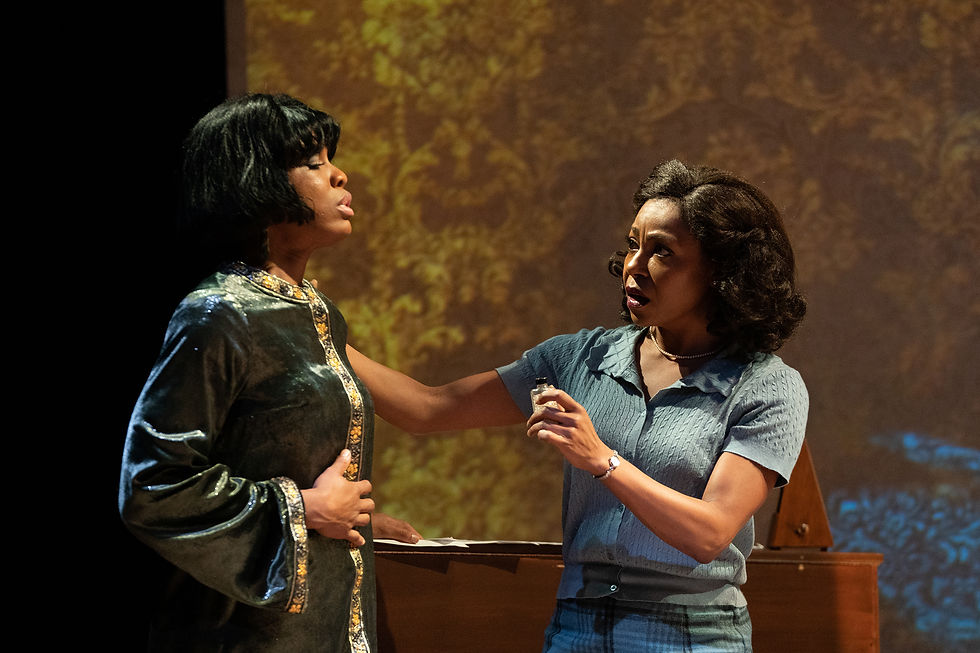
Simone, who never cared a wit for record deals, the charming of besuited white producers or even the trajectory of her own career in popular music, is a Cassandra singing in the dystopian rubble — of a building, of an ideal, maybe of her own self.
Its setting is not Ronnie Scott’s, but the 16th Street Baptist Church in Birmingham, Alabama, in the aftermath of the notorious 1963 bombing on September 15th. Four little girls — Addie Mae Collins, Denise McNair, Carole Robertson and Cynthia Wesley — died when a bomb placed by members of the Ku Klux Klan detonated on the east side of the building. The four girls were in the basement.
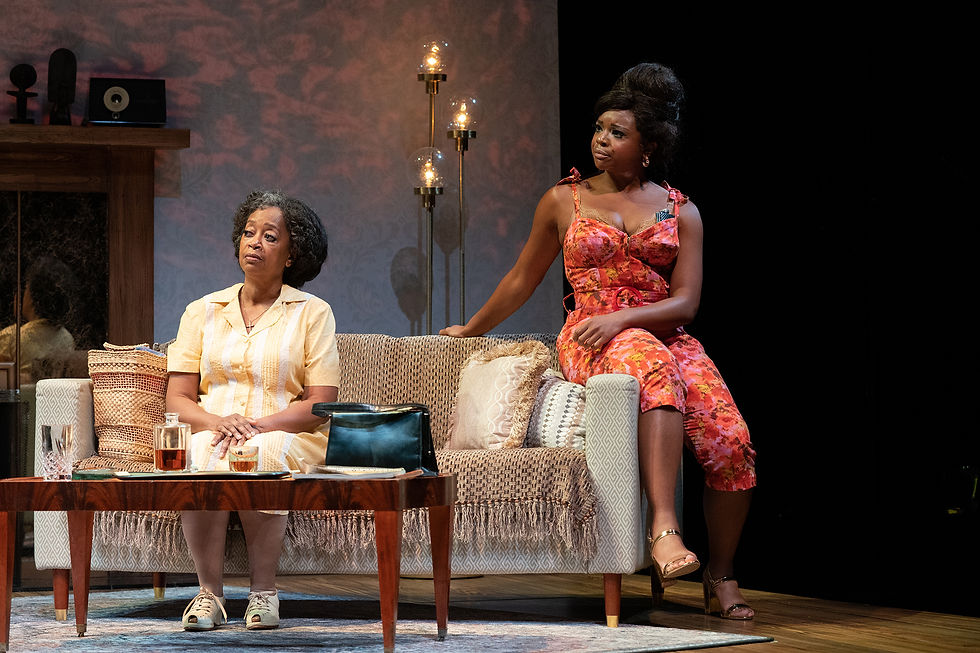
She was so affected by the bombing, she wrote a song titled “Four Women.” It was a tribute to the four young women who were murdered in that act of terrorism. The Village Voice called the song "an instantly accessible analysis of the damning legacy of slavery…”
Simone did go to the 16th Street Church and she was, of course, a significant figure in the civil rights movement, an activist and black nationalist, a voyager to Liberia, a fan of Malcolm X, a confidante of both Martin Luther King and Harry Belafonte, a political radical provoked, in part, by the institutional barriers that had been thrown up in the way of her own potentially formidable classical career. So, there is plenty of historical precedent for nternational award-winning playwright Christina Ham’s underlying message, who has also written and produced drama series for Netflix, Amazon and Warner Brothers.
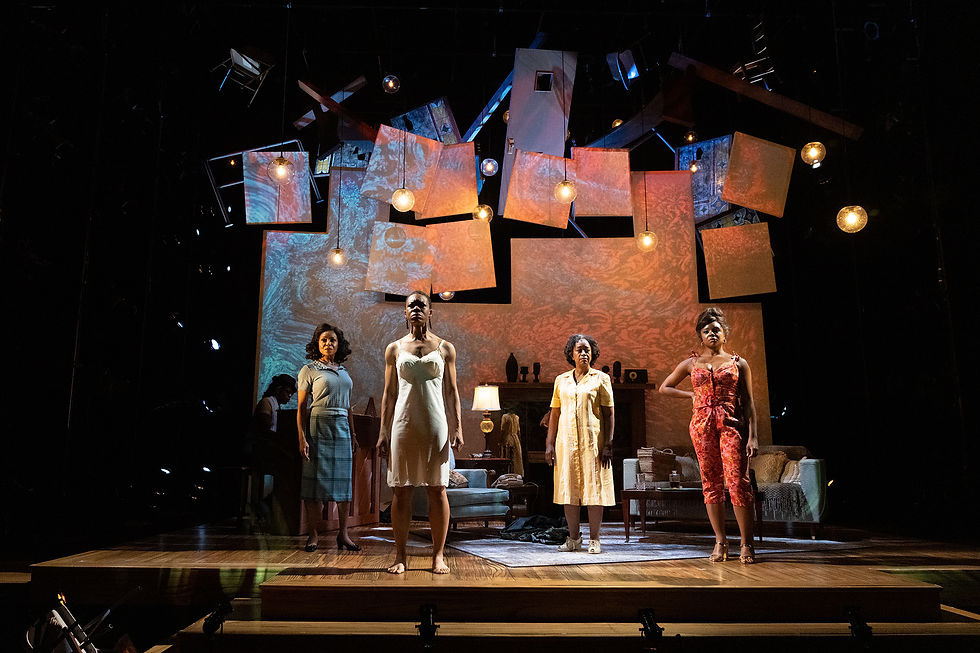
The Simone song that most interested Ms. Ham was her self-penned “Mississippi Goddam,” an anthem that didn’t so much express pain as it did raw anger at the Old South — as concisely expressed by two words as any lyric from any song in that era. Over the years, the song has come to occupy a similar place in the cabaret repertoire of many a blues singer.
It is a moment when people stop talking, swallow their drink hard and, in some cases, feel their own complicity. It’s a song that banishes any and all romanticism; it was as if Simone barely could set it to music, barely could bother with the requisite notes, so much does the lyrical sentiment overtake anything dangling underneath.

Remarkably well cast in director Logan Vaughn’s ("The Light") production, Chibuba Osuala (NYU Tisch Graduate Acting) as Nina Simone doesn’t have Ronnie Scott’s veneer to shake off. On the contrary. She is naturally intimidating and goes right to where Simone would have been in that moment.
There is actually a lot going on with Ms. Osuala, which is a prerequisite for this particular role, being as there always was a lot going on with Simone. She tends to impose her own pacing on scenes — delaying a line here and there until she has completed whatever she first wants to do in its service. But there are crucial mountaintops of vulnerability, too. The effect, which is remarkably close to the experience of watching Simone live, is to make you lean into her bracing performance, trying to take its fullest measure.
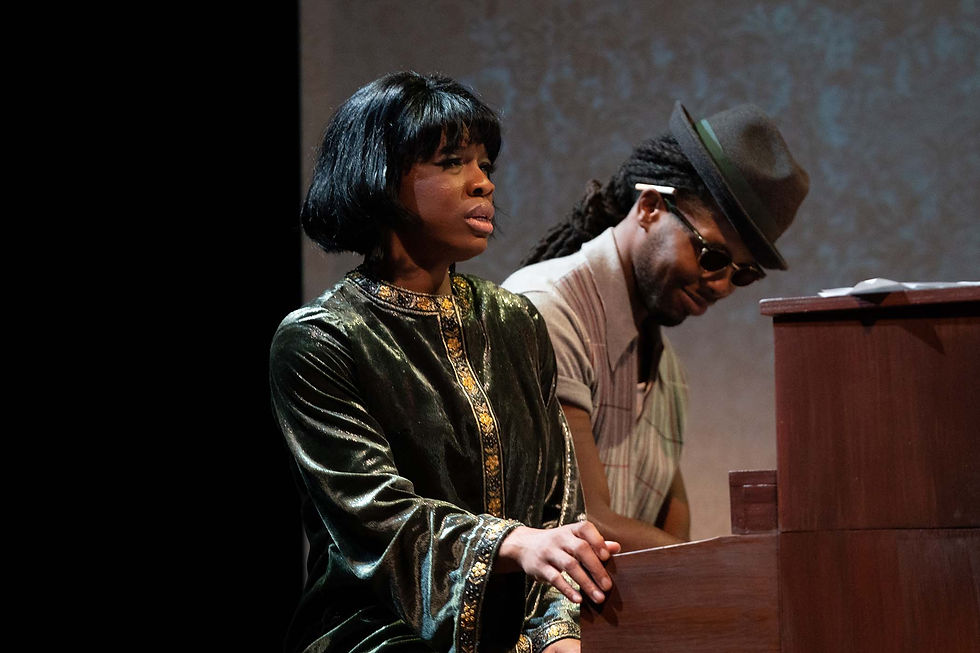
Of course, Chibuba Osuala is not the only actor on the stage. Ms. Ham imagines a conversation, often musical, between a quartet of African-American women with different appearances and from varied walks of life. Aside from Ms. Osuala’s representation of Simone herself, these include a housekeeper named Sarah (Jennifer Leigh Warren; "Big River"), who is partly there to point out that Southern blacks had to navigate living with, and often working for, intractable whites, after the activists went home to the North.
There’s a lovely young woman, Sephronia (Arie Bianca Thompson; "Our Daughters Like Pillars"), and a pragmatic streetwalker with dreams of Chicago, called Sweet Thing. She’s played by Meredith Noel, in a role a million miles from her “A Christmas Carol” turn that helped entrance her regional career. All four of the actresses are very strong and the harmonies are consistently superb. The effect is of pulsating, resigned weariness, each with individualized, sharply dramatized voices.
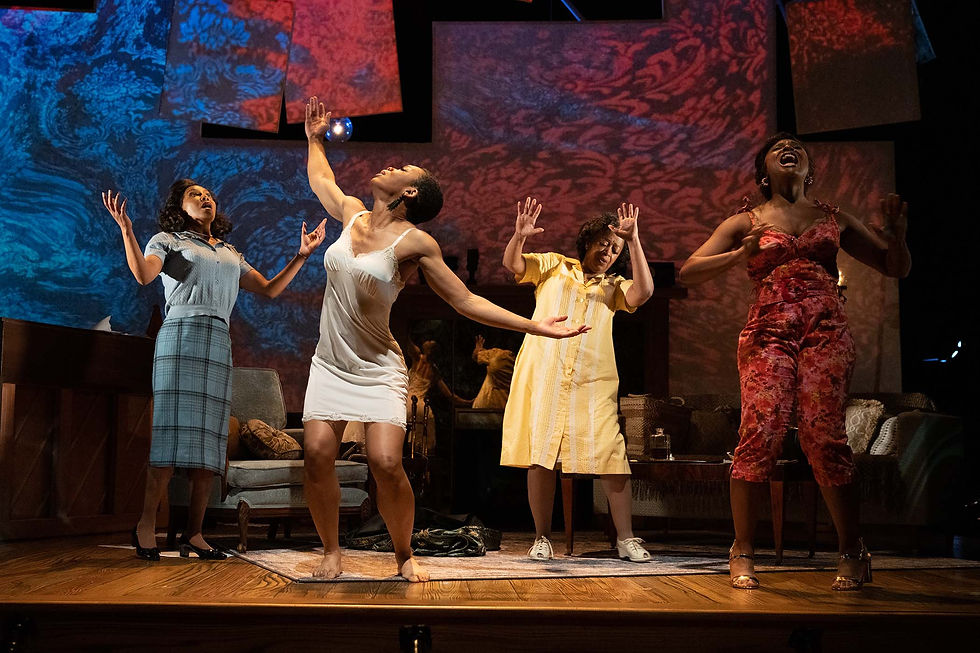
Sarah is old, and her strong back has allowed her only “to take the pain inflicted again and again.” Sephronia’s lighter skin and long hair are the result of her rich white father having raped her mother — “Between two worlds I do belong”— and Sweet Thing has tan skin and a smiling bravado that seduced at least some of the eager Dutch listeners into the mistake of smiling, too.
But “Nina Simone: Four Women” has its devices. As with many revues, there is a piano player, Sam Waymon, played by music director, pianist and composer Richard Baskin Jr. ("Freestyle Love Supreme"), who is not fully explained in the play nor integrated into the story. Yet, it is safe to say without the support of Mr. Baskin Jr. making the musical orchestrations so theatrical, they would not be so important to the play, offering superb accompaniment on every number.
During the show, a number of issues are addressed: The looming threat of Jim Crow outside the broken walls of the church, the role of Black women within the Civil Rights Movement and what’s the best method to create change while living in an unjust system. Is it marching? Through music? Who is good enough to be centered? The intricacies of internal politics in the Black community are also presented: Sephronia is referred to as “high yellow” and the brown paper bag test is mentioned, along Jack and Jill, a highly selective Black organization for the children of professionals.
“Four Women” is a drama mixed with subtle humor. The concept is compelling, the performances perfect, the writing astute and the music is phenomenal. And they sing. Oh, how they sing. Songs that are either written by or associated with Nina Simone. Each number is presented not only as a thrilling musical interlude, but they serve as a dramatic punctuation mark to the onstage drama. And too, the uplifting gospel songs offer relief from the onstage tensions.
The piece contains “To Be Young, Gifted and Black,” a song co-written by Simone with a title taken from her friend’s unfinished play, a song which you could easily imagine Beyoncé covering and turning into a chart-topping hit. It is the most joyous moment of a night with very little happiness and, as such, it rings out with the hope we all still need. Simone knew that better than almost anyone, and spent a lifetime unpacking what all that meant.
NINA SIMONE: FOUR WOMEN, BY CHRISTINA HAM, Now Playing at South Coast Repertory, October 2-23, 2022 on the Julianne Argyros Stage; Directed by Logan Vaughn; Musically Directed, Composed and Arranged by Richard Baskin, Jr.; Scenic Designer Jack Magaw; Costume Designer Jessica Ford; Lighting Designer Christine A. Binder; Original Music/Sound Designer Everett Elton Bradman; Choregrapher Kevin Boseman; Projection Designer Yee Eun Nam; Casting Joanne DeNaut CSA; Stage Manager Randall K. Lum; Artistic Director David Ivers; Managing Director Paula Tomei; Founding Artistic Directors David Emmes & Martin Benson.
WITH: Chibuba Osuala, Jennifer Leigh Warren, Arie Bianca Thompson, Meredith Noel, Richard Baskin Jr.; Understudies: Keiana Richard and Maya Smoot.
For Tickets and further information, please visit www.scr.org
Chris Daniels
Arts & Entertainment Reviewer
The Show Report
Photo Credits: Jenny Graham









Comments